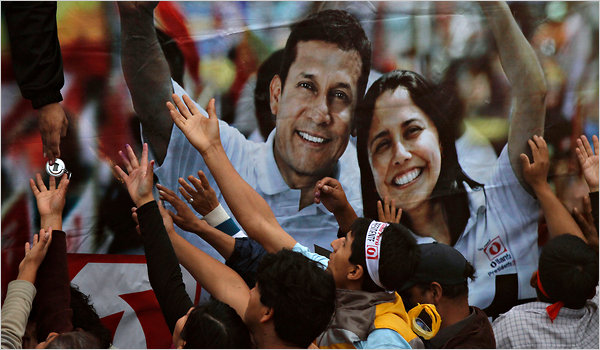
(above) With a poster of Ollanta Humala as a backdrop, a crowd celebrated in Lima after hearing unofficial results that he was ahead. Photo: Martin Mejia/Associated Press
Ex-Officer Set to Win Narrow Victory in Peru
June 6, 2011 - New York Times
By SIMON ROMERO
LIMA, Peru — Ollanta Humala, a nationalist former military officer who vows to expand antipoverty programs, seemed headed to a narrow victory in the presidential election against his rival, Keiko Fujimori, according to incomplete official returns.
Mr. Humala’s victory would be a rebuke of the economic model that has driven robust growth in Peru, even as millions of citizens who are mired in poverty have felt left out.
Mr. Humala, 48, toned down his once-radical views and retooled his image into that of an admirer of the former Brazilian president Luiz Inácio Lula da Silva, a moderate leftist.
With 88.4 percent of the ballots tallied, Mr. Humala was leading with 50.087 percent, vs. 48.7 percent for Ms. Fujimori, the official electoral regulator said Monday morning.
The race between Mr. Humala, who lost a 2006 bid for the presidency after aligning himself with President Hugo Chávez of Venezuela, and Ms. Fujimori, the 36-year-old daughter of former President Alberto Fujimori, who is in prison, stunned many voters after centrists split the middle-class vote in the round of balloting in April.
Still, the rise of Mr. Humala, who wants to raise taxes on mining companies and assert a bigger government role in parts of the economy, reflected broad discontent over how Peru’s economic boom was failing to lift many people out of dire economic conditions.
“I voted for Ollanta because I think he can change the system in Peru in a more drastic way,” Ricardo Paima, 18, who is studying to become a mechanic, said after casting his ballot in Lima.
Peru’s economic growth has awed its neighbors and transformed parts of Lima, the capital, into glittering districts of office towers and expensive boutiques. But the reluctance of the departing president, Alan García, to focus on reducing poverty left many people unhappy.
In a survey last month of voter sentiment by the Catholic University here, just 22 percent of the respondents said that Peru’s current economic policies should be maintained by the next president. “Given the boom, the fact that only one in five want to maintain the status quo is extraordinary,” said Steven Levitsky, a Harvard professor of government who is teaching in Lima this year.
Mr. Humala, who led a failed military revolt in 2000, has battled claims that he tortured civilians as a counterinsurgency officer in the early 1990s, which has raised skepticism about his recent evolution.
In an interview in April, Mr. Humala insisted that he had taken stock of his earlier ideas and had changed with the times.
“Peru has changed, so we politicians must also change,” he said, adding that he would seek to maintain warm ties with the United States. Mr. Humala also said explicitly that Venezuela’s economic and political model was not applicable to Peru.
“I don’t think he’s a Chávez or Lula clone,” said Bill Richardson, the former New Mexico governor, who came to Peru as an observer for the Organization of American States and had private meetings with both candidates in recent days. “I believe Humala’s a nationalist with evolving views and a pragmatic streak,” Mr. Richardson said in an interview.
Others here refuse to believe that Mr. Humala has changed, revealing schisms that economic growth alone have been unable to resolve. Resistance within Peru’s conservative establishment could make it hard for Mr. Humala to advance his ambitions.
Aldo Mariátegui, a right-wing commentator, wrote a column this week in the newspaper Correo titled “Don’t be Stupid,” in which he denigrated those who were considering a vote for Mr. Humala.
“Clearly, we’re in Peru and we had to defecate on it,” wrote Mr. Mariátegui, referring to Peru’s decade of robust growth. “We cannot triumph; we need to try drowning ourselves before reaching the shore.”
Representing another school of thought within the elite, Mario Vargas Llosa, a conservative writer who is Peru’s most prominent intellectual, backed Mr. Humala largely out of fear of returning to the authoritarianism of Mr. Fujimori, who is serving a 25-year prison sentence for human rights abuses.
Still, Mr. Humala could face a challenge in trying to reach out to the large number of voters who chose his opponent in a bitterly contested and polarizing campaign. Many voters expressed disdain for both candidates, and arrived at their decision after agonizing over the choice.
“I voted for Keiko because she’s the least bad,” said Alfredo Larrabure Cockburn, 44, a systems engineer. “I decided this once I knew what the options were.”
Andrea Zarate contributed reporting